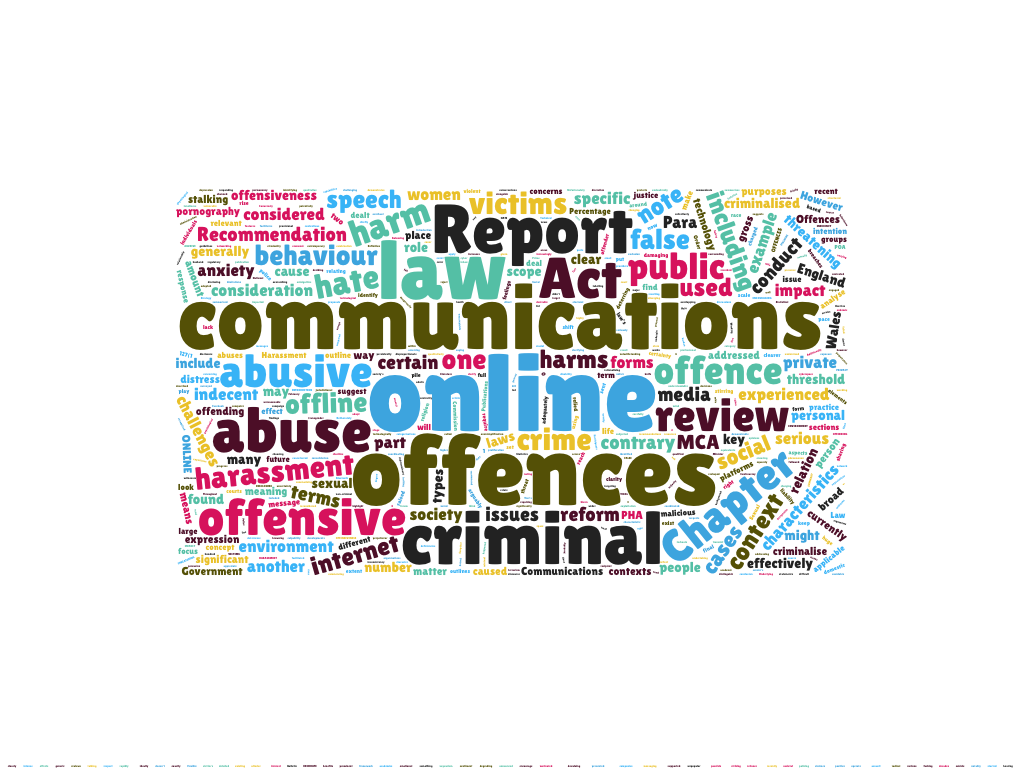Law Commission report asks for complete reform of online offensive communications

In 2019 ORG will be doing more work on the regulation of online content and free expression, as there are various important government initiatives in the area that could impact the rights of internet users. Earlier this year the Law Commission was asked to conduct an analysis of the criminal law in relation to offensive and abusive online communications. It makes some sensible recommendations for thorough reform of the relevant legislation. The government now has to fully respond and agree to move on with more pre-legislative work.
ORG believes that the current level of online abuse – particularly against vulnerable groups: women, ethnic minorities, migrants, transgender people or those with disabilities, among others – is unacceptable, but we also consider that there are some areas where restrictions on online speech are not consistent and may impinge on free expression. This is a difficult area, and the thorough approach of the Law Commision is welcome. ORG staff met the Law Commissioner for extensive discussions.
Their focus is whether the criminal law provides equivalent protection online and offline. Excluded from the scope are terrorism offences, child sexual abuse and exploitation offences, online fraud and contempt of court.
The key offences considered are the “communications offences” under the Malicious Communications Act 1988 (“MCA 1988”) and s127 of the Communications Act 2003, but also looks more widely at harassment and public order. The LawCom sees as positive that these do not require evidence of “actual harms” and are therefore easier to prosecute. This actually supports our argument as to their use as “consolation prizes”.
The report recommends tightening the scope of the offences. MCA 1998 is unclear on whether it covers public internet fora or only messages directed to a specific person. s127 does not cover private networks, such as bluetooth or LANs. An interesting point raised is that s127 would cover materials stored in cloud but never actually sent. This could have huge implications if followed through by prosecutors.
The Law Commission engages in a thorough discussion of the term “grossly offensive”, mentioning this is one of the issues we raised with them. The report tracks ongoing problems with defining the term since its inception in the Post Office Protection Act 1884, including the relation of “grossly offensive” to obscenity, vulgarity, vilification; and criticises its impact on freedom of expression. The term continues to lead to controversial prosecutions despite the introduction of insufficient Crown Prosecution Service guidelines because the underlying proscribed conduct is very broadly interpreted and the concepts are malleable.
We welcome the report’s recognition that “grossly offensive communication may in fact be more broadly criminalised online than in the offline world”, as long argued by ORG, due to the pervasive record created by online communications and their much broader reach. The Law Commission diplomatically argues for the term to be removed through a further review.
The report extends those criticisms to the notions of “obscenity” and “indecency” and criticises the details of a wider array of related offences, recommending a thorough review, including the potential impact on private online communications of the Obscene Publications Act 1959.
Throughout the report, we see a pattern where the potential negative impact of various offences could be even worse if the criminal justice system decided to apply them with the simplistic principle that everything that applies offline should equally apply online.
The report makes recommendations on various other areas, such as harassment and staking, hate crime and non consensual disclosure of private information, including sexually explicit images. There is also an analysis of the online environment and challenges to policing, which explores some of the technical difficulties in establishing the identities of perpetrators, but not in great detail. Thankfully, there are no proposals for changes to anonymity online or demands for increased data retention.
Importantly, the report also details the harms caused by offensive communications, particularly to women, and digital rights advocates should read it carefully to increase our self-awareness and avoid potentially insensitive arguments in our quest for due process and the protection of civil liberties.
